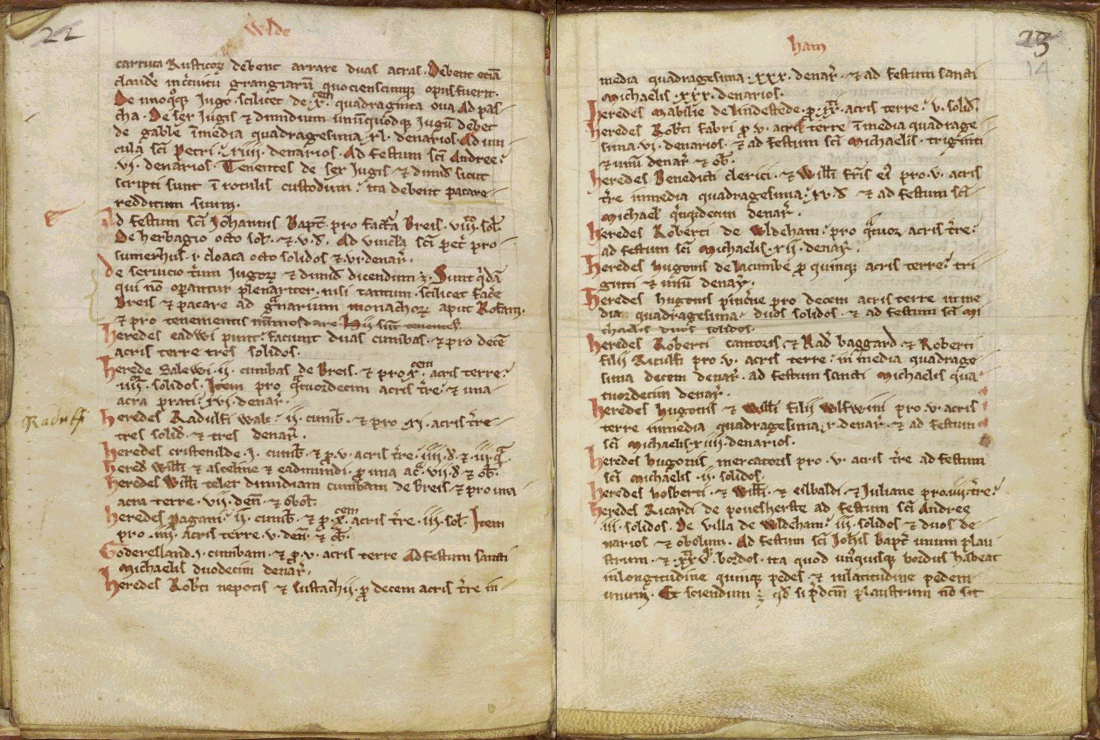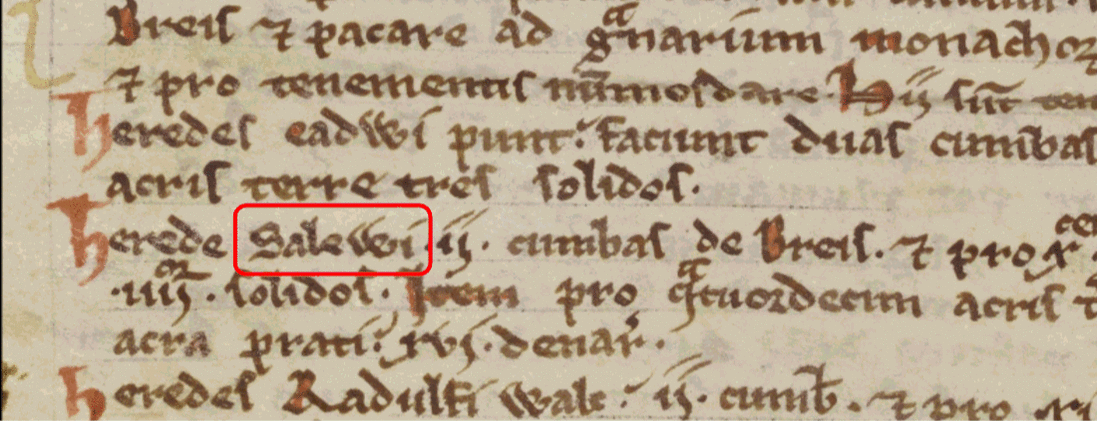|
The second in Dr Monk's series 'Reseach Snippets'. Here, in part 1, he takes a look at the problem of translating medieval Latinised names into modern English. In part 2, he will be exploring women's names and the meanings behind surnames. Translating a thirteenth-century custumal, you come across an awful lot of names: names of people who owe services, money or food rents to the manorial lord. In this case, the lord is a collective one, being the Bendedictine brothers of the cathedral priory of St Andrew, in Rochester. There are plenty of well-known given names (i.e. fore or first names) that appear frequently: John, Robert, William being three of the most common. But there are more unusual ones, too, such as Edwy and Salvi. As the manuscript I'm translating, Custumale Roffense, is written in Latin, the names are usually Latinised. So John is Johannes; Robert, Robertus; and William, Willelmus. For the purpose of writing for a general audience (I'm writing a book about everyday life in the monastic world of thirteenth-century Rochester), I have to make a decision about how to translate Latinised names. Most of the folk mentioned in the custumal are ordinary people working the land, and it's extremely unlikely they would have gone around using the Latinised forms of their names! My usual response as translator is to choose what is called the canonical name form, a standardised form that doesn't necessarily represent how a person would have written their name, were they able to do so, in the vernacular at the time, or indeed give us much of an indication of how exactly they would have pronounced their name. As I often say to myself, translation is always a compromise. But whereas choosing John, Robert and William seems pretty straight forward, and not too controversial, sometimes the decision making process is more difficult for rarer names. Let me take the two examples above of Edwy and Salvi to illustrate what I mean. As a scholar who's spent a lot of time looking at the Anglo-Saxons (pre-1066), using the standardised name form of Edwy grates on me, to use a piece of idiom from my childhood. This is because I know it derives from Old English Eadwig (the 'g' here is soft, by the way, and sounds similar to the ending on the modern name Eddie), and in fact appears in our 13th-century manuscript as eadwi, as you can see in the image above; and so it preserves the Old English ea vowel combination (known as a diphthong).* *Technically, eadwi is in the genitive, or possessive, form, as it is part of the phrase Heredes eadwi, 'the heirs of Edwy', and so grammar dictates it must end with i. So part of me wanted to keep the ea in my translation, because I liked the idea that this person had an English, rather than a Norman-French, name, and maybe he still said his name the way the Anglo-Saxons probably said it, which is more like Adwy than Edwy. But then I reminded myself that I wouldn't do that with other Anglo-Saxon names like Eadweard, which I would readily update to Edward, and so I have ended up conforming to the canonical form of the name. Alas! My choice of the name Salvi is problematic for a different reason, namely, I din't have much to work with! In the manuscript, as you see above, the name is written Salewi.** **Technically, the i ending here indicates it's in the genitive, or possessive form, because it's part of the phrase Herede[s] Salewi, 'the heirs of Salvi'. My hunch was that the name was a form of the Latin salvus (meaning 'safe, saved'). When translating medieval Latin, there is sometimes a correspondence between the letters w and v (for example the name Alvice has the Latin form Alwidis). This led me to check for possible names that derive from salvus, and so I arrived at Salvo. However, Salvo has an Italian origin, and that didn't seem to fit comfortably with 13th-century England. I had wondered if it might be a name with a Nordic origin, and so my search then led me to the Old Norse name Salvi. I didn't exactly shout ta-dah! or Hallelujah! but this Nordic name seemed a more appropriate rendering. Ah, translating medieval languages is not always an exact science! Women's names One of the things that I've found very interesting when translating this custumal is that not all the tenants' names are masculine, confirming the fact that women did hold land in later medieval England. A number of widows are named outright as landholders owing services or rents to the monks, but I was a bit surprised to discover that the names that appear in the commonly occuring phrases 'the heirs of so-and-do' and 'son of so-and-so', were not always men's names. For some reason, I had assumed they would be. I will be discussing this in more detail in part 2 of this research snippet, and I'll also be taking a look at surnames, wich are often referred to as bynames. See you there!
7 Comments
The Anglo-Saxon Monk
15/9/2018 03:29:05 pm
Bless you, Kay. Radulfi is the genitive form of Radulfus, which is normally translated as Ralph, though Dr Monk tells me he sometimes spells it Ralf, depending what mood he is in.
Reply
Sylvia Wright
22/9/2018 10:42:01 am
I thought Ralph was pronounced as Raefe?
Christopher Monk
16/9/2018 08:49:33 am
I'm thinking, Kay, maybe I should do a quiz on names. What do you think?
Christopher Monk
16/9/2018 08:48:09 am
😊😊😊 Ah, what fun we have!
Reply
Your comment will be posted after it is approved.
Leave a Reply. |
Details
|




